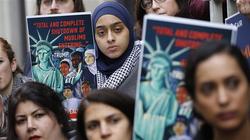 Rights groups have condemned the expansion of US President Donald Trump’s controversial travel ban, saying the administration is advancing a xenophobic agenda.
Rights groups have condemned the expansion of US President Donald Trump’s controversial travel ban, saying the administration is advancing a xenophobic agenda. RNA - Trump added Africa’s biggest country, Nigeria, as well as Sudan, Tanzania, Eritrea, Kyrgyzstan and Myanmar to his restricted travel list in an expanded version of the original travel ban imposed by him in 2017.
Human rights advocates said families, universities, and businesses in the United States were paying the price for Trump's "ignorance and racism".
The American Civil Liberties Union (ACLU) protested that the "Muslim ban should be ended, not expanded".
"President Trump is doubling down on his signature anti-Muslim policy - and using the ban as a way to put even more of his prejudices into practice by excluding more communities of color," said Omar Jadwat, director of the ACLU's Immigrants' Rights Project.
"Families, universities, and businesses in the United States are paying an ever-higher price for President Trump's ignorance and racism," Jadwat said in a statement.
Rights groups slammed Trump's pursuance of white supremacist and exclusionary policies, discriminating people across the globe on the basis of their faith, skin color and place of birth.
"Trump administration continues to push white supremacist and exclusionary policies that discriminate on the basis of faith, national origin, and immigration status," said Javeria Jamil, a state lawyer at the National Security & Civil Rights of Asian Americans Advancing Justice - Asian Law Caucus.
"From scapegoating Muslims with the Muslim Ban to now expanding the same restrictions to other immigrant communities of color, the Trump administration continues to weaponize immigration law in order to advance its xenophobic agenda," added Jamil.
Rights defenders said Trump's "deadly, dangerous and disastrous" policies "rooted in hate, white supremacy and racism" were creating security risks.
“The Trump administration’s efforts to expand the ban are offensive and actually harmful to our national security,” said executive director of Amnesty International’s US chapter, Margaret Huang, in a statement.
“Our research has demonstrated how every version of this ban has shown itself to be deadly, dangerous and disastrous. This policy is rooted in hate, white supremacy and racism,” she emphasized.
According to the US Department of Homeland Security, only certain visa categories would be targeted in the latest directive, with the focus primarily on people seeking to move to the United States rather than those simply desiring to visit.
The latest directive – due to go into effect on February 22 -- is less sweeping than the travel ban Trump imposed in January 2017, which banned citizens of mostly Muslim-majority nations from entering US territory.
The previous list included: Iran, Libya, Syria, Yemen, Somalia, North Korea and Venezuela.
847/940